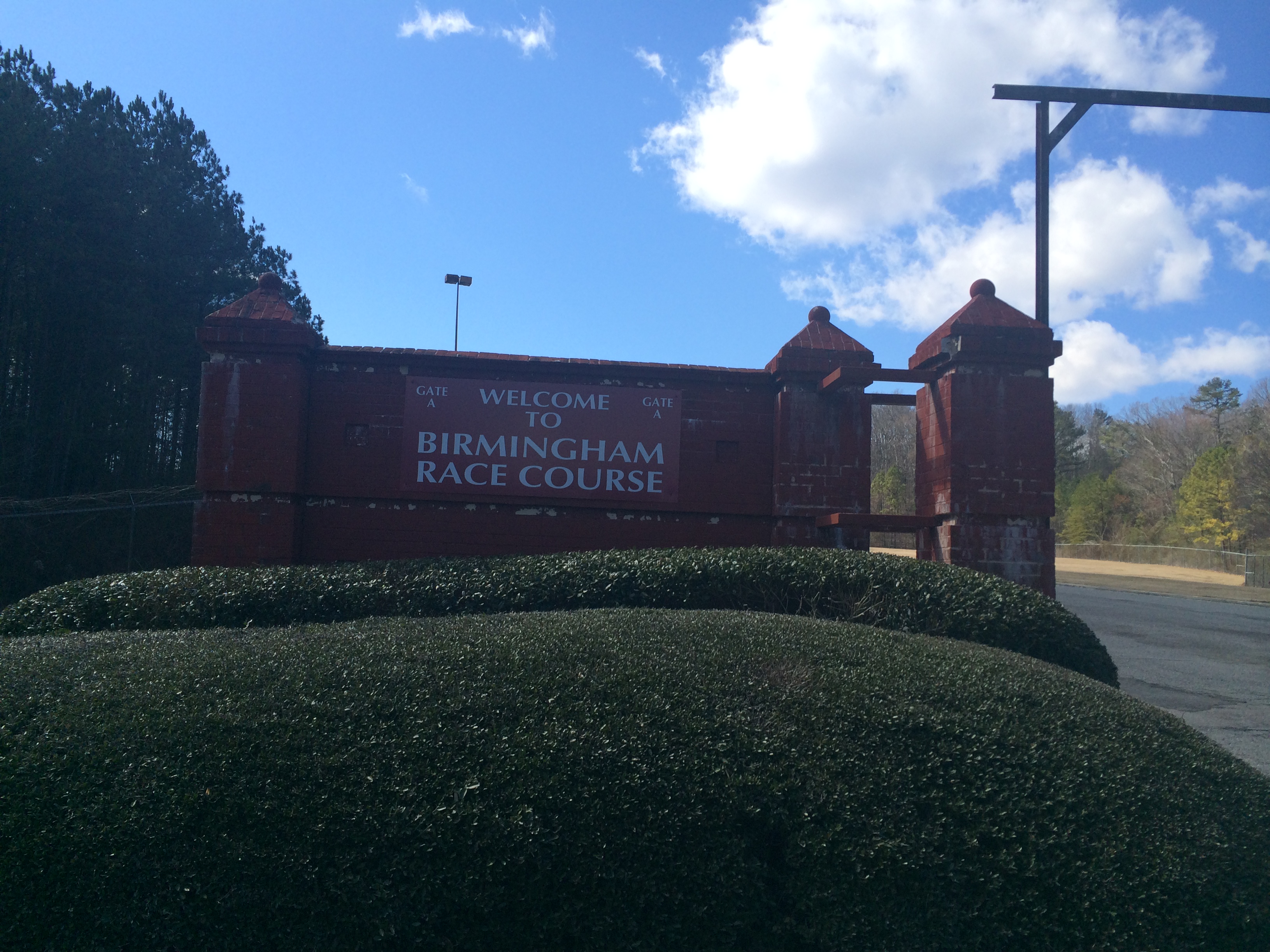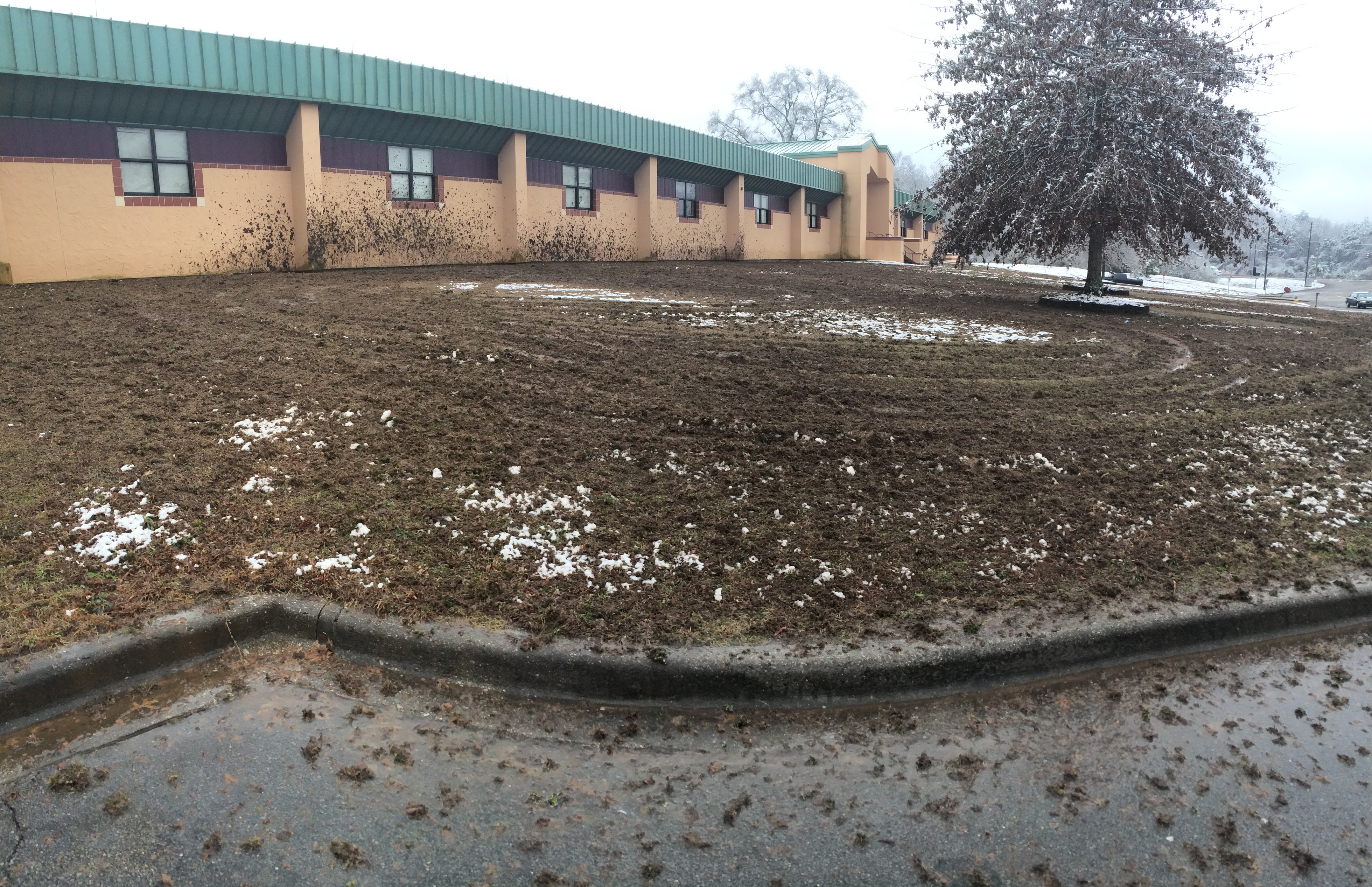Wagering at Birmingham Race Course in ‘catastrophic decline,’ advocate says
By Gary Lloyd
BIRMINGHAM — Christine Dorchak is taking aim at Alabama.
Dorchak, president and general counsel of the greyhound rescue group Grey2K USA Worldwide of Arlington, Mass., said last Thursday she’s partnering with Baptists and the Humane Society in Alabama for a campaign to end dog racing in Alabama.
There are two dog racing tracks in Alabama — Mobile Greyhound Park and the Birmingham Race Course. The latter is off John Rogers Drive, mere minutes from the Trussville city limits.
Dorchak has written legislation for other states that requires them to report about injuries to greyhounds and deaths during races. She’s hoping to find a legislative sponsor in Alabama. This year’s legislative session begins March 3.
Dorchak, along with Alabama Citizens Action Program Executive Director Joe Godfrey, held a press event last Thursday to talk about dog racing in Alabama.

The Birmingham Race Course sits just a few miles from the Trussville city limits.
photo by Gary Lloyd
“It’s a story of dogs who suffer and die just so someone can place a $2 bet on them,” Dorchak said. “It’s completely pathetic. It’s costing dogs their lives and it’s costing taxpayers money.”
Bad business for dogs
There are 21 dog racing tracks left in the United States, and 14 of them are in Alabama and Florida, Dorchak said. She said dog racing is legal in seven states, and Alabama is one of two that doesn’t report greyhound injuries to the public.
“It’s a very bad business for the dogs,” she said.
Dorchak said kennel conditions are poor at the tracks, particularly at the Birmingham Race Course. According to her report, “High Stakes: Greyhound Racing in the United States,” a persistent flea infestation was documented in 2013, yet it appears no disciplinary action was taken by the Birmingham Racing Commission against the kennel. Dorchak reported that repeated problems were documented in inspections that year, yet regulators failed to take action to correct the issues or punish those responsible.
In her report, Dorchak states there have been at least two cases in Alabama of racing greyhounds testing positive for cocaine since 2009. One was at the Birmingham Race Course, and it resulted in a $750 fine. She said the dogs are fed raw “4-D” meat, derived from dying and diseased animals, used to reduce costs.
She said common injuries include broken legs, broken necks, broken skulls and electrocution.
“These dogs are living like this every day and nobody is looking out for them at these racing commissions,” she said.
A dying industry
Wagering on live greyhound racing at the Birmingham Race Course declined by 20 percent between 2012 and 2013, Dorchak said. From 2008 to 2013, the amount gambled on live greyhound racing at Mobile Greyhound Park decreased by 61 percent, she said.
“Wagering is in catastrophic decline,” she said.
She said 42 tracks have closed since 1991. The Birmingham Race Course opened in 1992, she said. Only 21 tracks are left across seven states.
“We’ve got a long way to go,” Dorchak said.
She said because the industry is dying, there’s little money to care for the dogs properly.
“A dog with a broken leg is probably a dead dog,” she said.
Effect on taxpayers, communities
On page 16 of her report, Dorchak states that in a 2011 study, economic professors from Auburn University and the College of Charleston concluded that greyhound racing tends to have a negative impact on state revenues in the jurisdictions in which it exists. The study found that each additional dollar of greyhound handle is estimated to reduce net state revenue by $7.61.
“It’s a parasite on taxpayers,” Dorchak said.
The Birmingham Race Course sits just a few miles from Trussville and is surrounded by the Irondale city limits. Does a diminishing race course affect the value of nearby Trussville?
“If the owner and the city of Birmingham could get its act together the results could bring more tax dollars to the I-459 and U.S. 11 area that could be a benefit to our businesses,” Trussville Mayor Gene Melton said.
Dorchak said wherever a track closes, there are better opportunities for the property. She said if a vacant track sits there, it takes away from nearby property values.
Melton said he would only wish the race course would close if “the owner and the city of Birmingham could create a higher and better use for the property.”
Moving forward
Dorchak’s goal is to phase out greyhound racing wherever it exists and prevent other countries from developing it.
“Our objective is to try and expose the ways to the cruelty of greyhound racing and just end it entirely,” she said.
Dorchak said the Birmingham Race Course hasn’t answered any of her group’s public information requests since May 2014. The information she does have comes from past reports and public records.
Dorchak said she’s sent copies of “High Stakes: Greyhound Racing in the United States” to every state’s legislators.
“We have quite a bit of work ahead of us,” she said. “We’re going in the right direction, but there’s a lot of work to do here in Alabama and around the world.”
Contact Gary Lloyd at news@trussvilletribune.com and follow him on Twitter @GaryALloyd.








